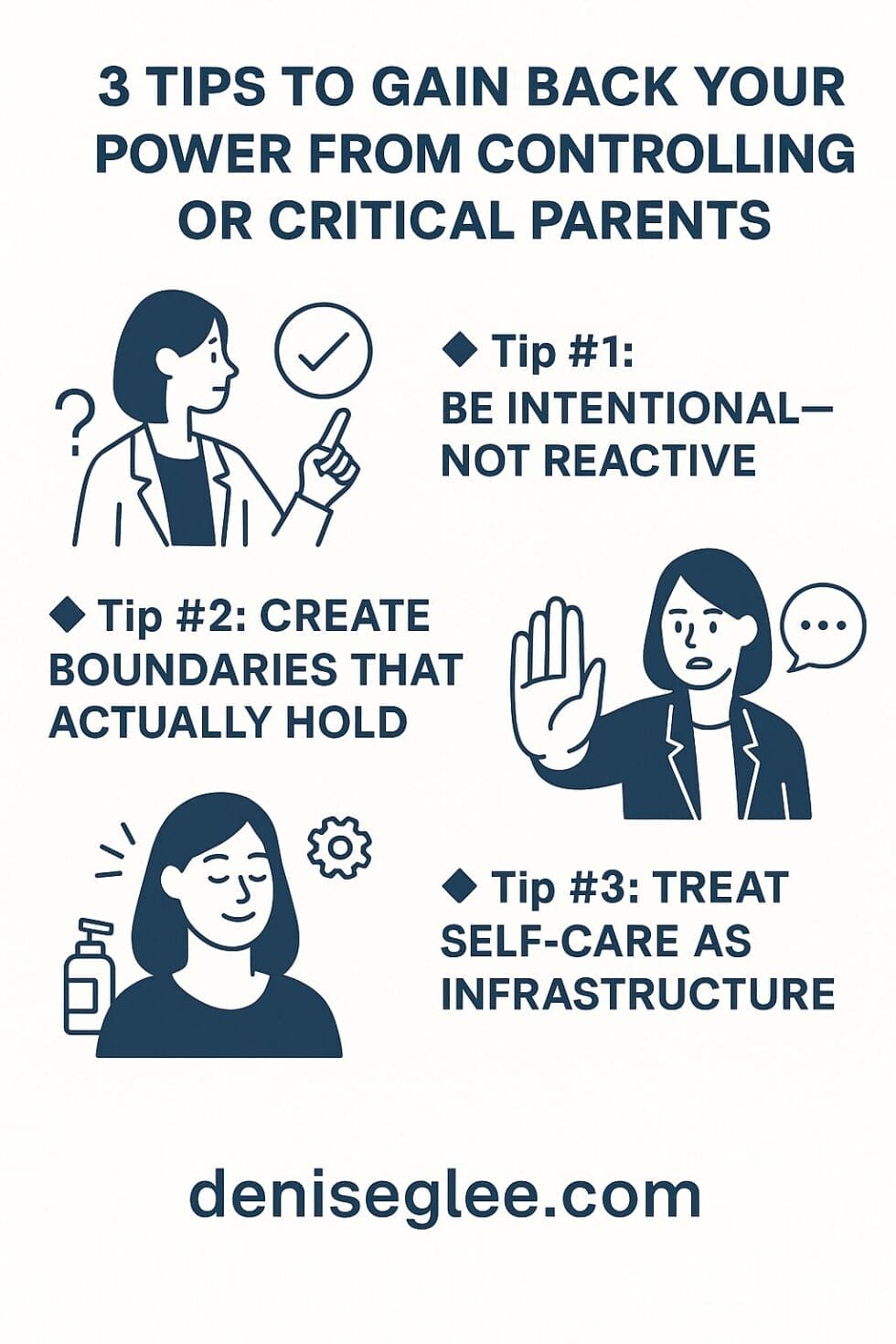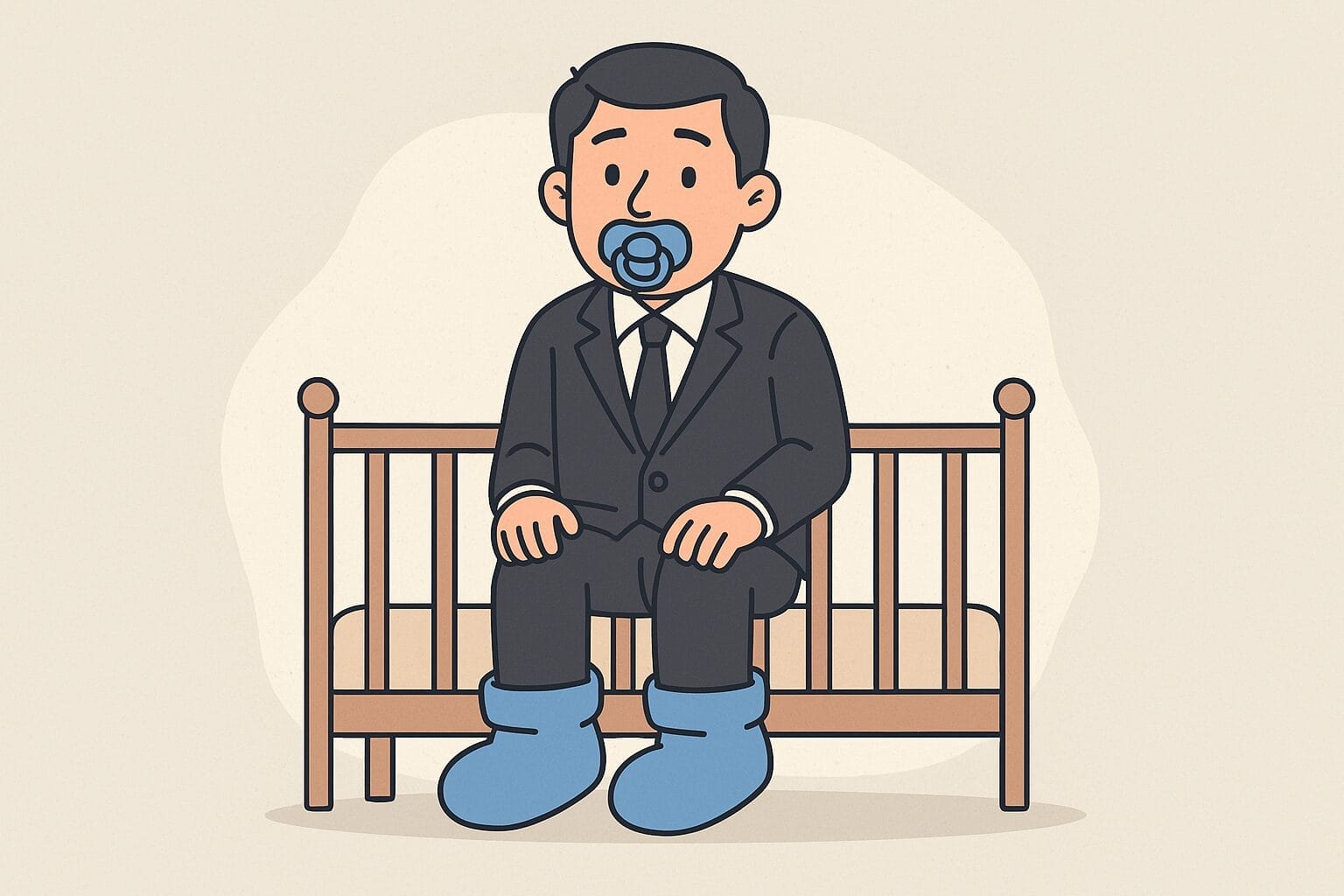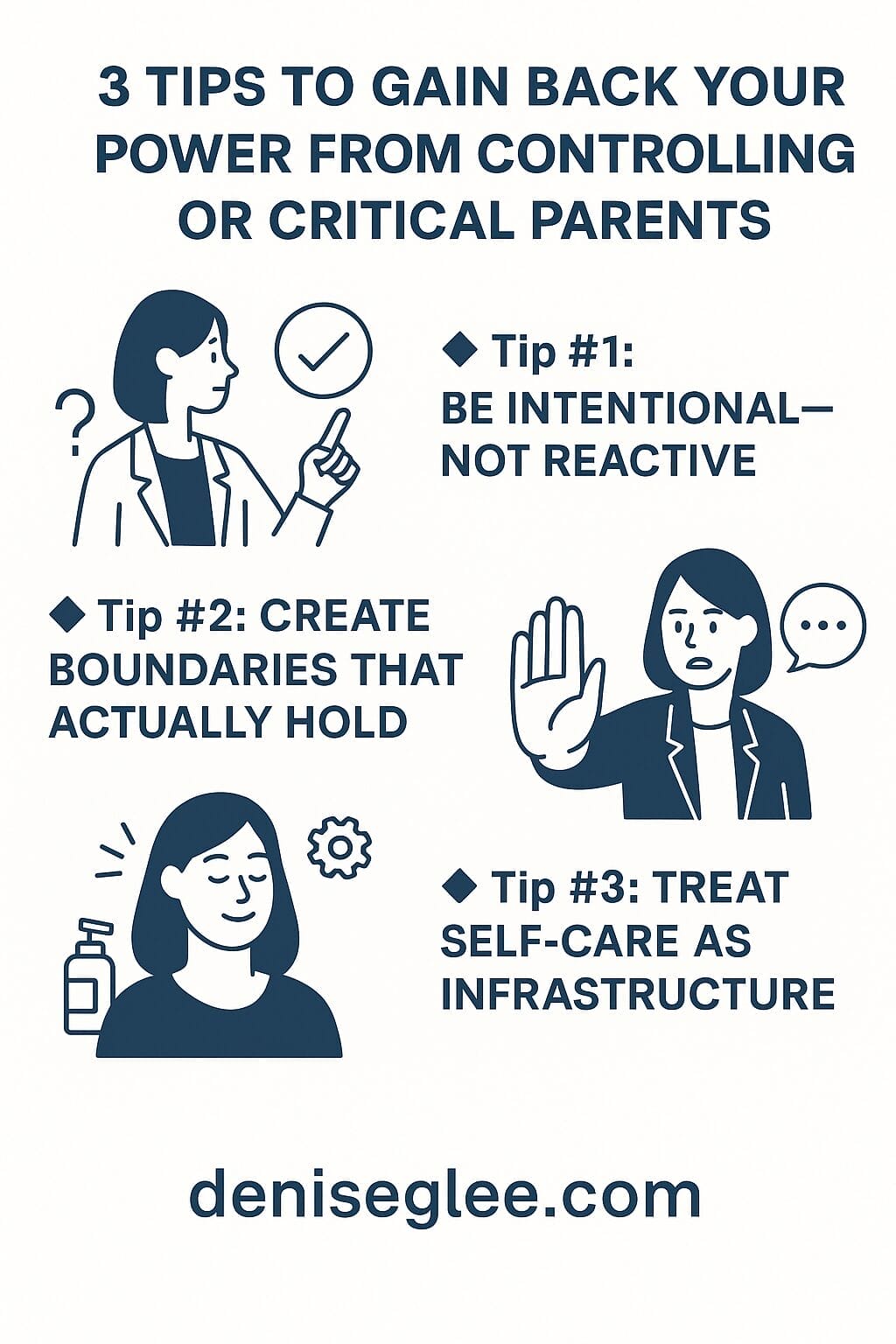
The Hidden Cost of Controlling Parents on Your Business Growth
- Updated: April 18, 2025
He could drive. Fix things I couldn’t do—even with all the mechanical YouTube videos in the world. He even seemed eager to work.
But his mother still managed every detail of his life—like he was helpless.
She wasn’t abusive or cruel.
She was “helping.”
And that’s what made it so easy to miss.
I saw it happen while volunteering at a clothing ministry.
A grown man—physically capable, socially functional—had been quietly kept small by a well-meaning, strong-willed mother who did everything for him.
Not because he needed it… but because she did.
As I watched it all unfold, I thought,
“Oh snap. This woman is a controlling parent. She needs her son to stay a baby forever.”
As a healing and leadership coach, I’ve seen this dynamic play out countless times—not just in families, but in businesses.
Leaders who hesitate.
Entrepreneurs who overwork and overgive.
Professionals who second-guess their instincts and quietly burn out trying to earn permission to be free.
If you’re a business owner or leader, this is worth your time.
Because the way you were parented may still be running the show—just in fancier clothes.
When you grow up with controlling parents, it doesn’t just shape your childhood.
It rewires your nervous system to obey, perform, and play small.
And that conditioning?
It doesn’t disappear when you get your LLC.
It follows you into client calls, hiring decisions, and your relationship with money.
Why Controlling Parents Still Try to “Wipe Your Ass” (Even When You’re Full Grown)
You’ve got a job. A car. Maybe even your own kids.
You run a business, manage deadlines, file your own taxes.
And still—your parent wants to check in on what you’re eating, how you’re spending, and whether you “really think that’s a good idea.”
At some point, the question hits:
I’m full-grown. Got a car, a business, maybe even a mortgage—and you’re still out here trying to wipe my ass like I’m five?
Here’s the hard truth: control makes insecure people feel safe.
Most controlling parents don’t think they’re being controlling.
They think they’re being loving, helpful, or responsible.
But underneath all that “concern” is usually one or more of these patterns:

🔹 1. Control is their comfort zone.
Some people grew up in chaos. So now, any environment they can’t micromanage feels like a threat—even when nothing’s wrong.
Your independence isn’t reassuring to them.
It’s destabilizing.
🔹 2. They don’t have a self outside of being needed.
Many parents—especially those who never did their own healing—wrapped their entire identity around parenting.
So when you don’t need them, they don’t know who they are.
This is especially true for single, divorced, or empty-nest parents who haven’t found another meaningful sense of purpose. Keeping you emotionally dependent keeps them emotionally relevant.
💬 As Dr. Lindsay Gibson, author of Adult Children of Emotionally Immature Parents, puts it:
“Emotionally immature parents often see their children as extensions of themselves rather than as separate individuals. As a result, they struggle to support their child’s independence, even into adulthood.”
This is especially true for single, divorced, or empty-nest parents who haven’t found another meaningful sense of purpose. Keeping you emotionally dependent keeps them emotionally relevant.
Too many of us are dying silently while trying to please others.
Denise G. Lee Tweet
🔹 3. They think your success is a reflection of their control.
To them, letting go = loss of credit.
If they didn’t guide you every step of the way, how will they prove they were a “good parent”?
So they keep “helping”—to keep collecting credit.
🔹 4. They fear your growth might expose their emotional limitations.
This one’s subtle but deep:
If you become confident, successful, or self-directed, it highlights all the ways they never healed.
And instead of celebrating you, they try to shrink you—so they don’t feel inadequate.
And here’s the kicker:
📊 A 2021 study published in Family Process found that parental psychological control during adolescence can have long-lasting effects on adult autonomy and emotional regulation—even when the child is financially independent.
This is why so many smart, capable leaders find themselves frozen when it’s time to make a bold move in business.
Because that voice that once said, “You sure you want to do that?” still echoes.
Not because you still need permission.
But because part of you was trained to wait for it.
This is why so many smart, capable leaders find themselves frozen when it’s time to make a bold move in business.
Because that voice that once said, “You sure you want to do that?” still echoes.
Not because you still need permission.
But because part of you was trained to wait for it.
And while all of this may sound obvious on paper, it’s much harder to spot when control wears a polite smile, lives in a nice house, and shows up looking like love.
Let me tell you about someone I once knew—someone who did everything “right” and still couldn’t breathe.
Messages from your family may be well-meaning, but it is hazardous to your health if they are misaligned with your dreams, interests, and passions.
Denise G Lee Tweet
The Perfect Daughter Who Couldn’t Breathe
You can look wildly successful on the outside—and still feel like you’re dying inside.

I knew a woman who had it all:
A PhD in biomechanical engineering.
A husband who checked every cultural box.
Three well-groomed kids.
And a high-paying job that made her family beam with pride.
Let’s call her Amy.
She wasn’t reckless or wild.
She was painfully obedient.
Obedient to her parents’ wishes.
Never questioning their vision for her life.
All the while agreeing to the idea being a good daughter meant disappearing herself.
We met through a Bible study, back when I had just gotten engaged. Amy shared that she wasn’t necessarily excited about the man she was dating—but he was everything her parents wanted. Educated. Korean. Christian. Polite.
They were married five months later.
And she couldn’t stop performing
Ten years in, Amy was unraveling.
Her husband’s income wasn’t enough to support their lifestyle, so she worked long hours in a high-stress job just to keep the ship afloat.
She couldn’t sleep.
She couldn’t rest.
And she couldn’t stop performing—for a father who still made it clear that her value came from her accomplishments.
She told me recently that she was thinking of living off her savings for a year, just to breathe. Just to exist without having to prove anything.
I don’t know if she ever did.
But what struck me most wasn’t the exhaustion—it was the programming.
Amy was doing everything “right.”
But none of it was for her.
And it was killing her spirit.
This is what happens when we live our lives for approval instead of alignment.
When we choose obedience over authenticity.
When we believe that meeting expectations is more important than honoring truth.
You don’t have to be the “perfect daughter” to know what this feels like.
If you’ve ever stayed in a relationship, job, or identity just to keep someone else comfortable—you’ve lived it.
And if you’re running a business or leading a team while still carrying that conditioning?
It’s showing up in ways you don’t even see yet.
Let’s talk about how.
When you are familiar with and honest about your needs, you will automatically steer clear of harmful people and activities. This is when you are respecting the desires of your soul.
Denise G. Lee Tweet
3 Ways to Reclaim Your Power from a Controlling Parent
As a healing and leadership coach, I want to give you tools that help you stop feeling like the “helpful child” and start showing up like the capable adult you already are.
Because let’s be real—when you’ve got a team to lead, clients depending on you, or a business to run, you can’t just drop everything because Mommy or Daddy is mad at you.
You need emotional sovereignty. Let’s talk about how to build it.

🔹 Tip #1: Be Intentional—Not Reactive
You can’t go back and undo that degree you got to please your parents. Or the job you took so they’d brag about you at church.
But you can choose what comes next.
That starts with being radically honest about your motivations.
Not everything you’re doing is for you—even if it looks successful on paper.
Ask yourself:
Would I still be doing this if no one I loved knew about it?
Am I trying to earn approval or avoid disapproval?
Do I confuse anxiety with intuition because I was trained to fear disappointing others?
Leaders don’t have time to live on autopilot.
Every yes has a cost. Make sure it’s not your peace, your marriage, or your mission.
🔹 Tip #2: Create Boundaries That Actually Hold (Not Just Theoretical Ones)
Telling your parent, “I’m busy,” means nothing if you answer the phone every time they call in crisis mode.
Saying you need space doesn’t work if you guilt-trip yourself into overexplaining.
Boundaries are not just about what you say—they’re about what you enforce.
If you’re leading a team, juggling deadlines, or just trying to make strategic decisions, you cannot afford to have a meltdown every time a parent sends a passive-aggressive text.
Start with clarity:
What topics are off-limits?
What kind of communication throws you off center?
What behavior crosses the line—and what will you actually do if it happens?
If you’re not sure where to start, ask yourself:
“What part of me still feels like I owe them full access, just because they raised me?”
That’s the voice you need to lovingly, but firmly, shut down.
🔹 Tip #3: Treat Self-Care as Infrastructure, Not a Luxury
If your self-care plan still looks like “bubble baths and hoping no one texts,” it’s time to level up.
You need a system—something that helps you regulate your nervous system, especially when old family patterns get triggered.
Because you can’t lead well if you’re emotionally hijacked.
Start with non-negotiables:
Who do you vent to when your parent’s guilt trip hits?
What boundaries protect your time, not just your energy?
When do you pause to check if your body is in stress mode… or if you’re just stuck in an old script?
Self-care is how you hold onto yourself when other people try to pull you back into old roles.
If you’re ready to design a self-care plan that works with your leadership style (and your reality), Amazing Attitude can walk you through it.
Not sure you caught it all? Don’t worry—the image below gives you the gist. Final thoughts coming next.

Final Thoughts
You don’t have to live your life reacting to guilt, pressure, or emotional manipulation.
As an adult, you can reclaim your power from a controlling, critical, or domineering parent.
But it starts with recognizing something most of us were never taught:
You have the right to choose.
You have the right to think differently, lead differently, and live on your own terms.
And you don’t need anyone’s permission to do so.
Protecting your autonomy isn’t selfish—it’s survival.
Your health, your peace, your leadership depends on it.
If you’re ready to find your voice and create new patterns that actually feel like you, I’d be honored to support you.
💛 Work with me, Denise G. Lee – Let’s unravel the old scripts and build a strategy that respects your truth.
👉 Start here
📝 Want to share your story with me?
I’d love to hear what this stirred up for you. Whether it’s a small moment or a lifelong pattern—you don’t have to hold it alone.
👉 Write me a note
🎙️ Prefer to listen?
Check out my podcast episode with Dr. Bob Beare where we explore the emotional cost of growing up under control—and how to heal from it. Click play below or listen on your favorite platform.


